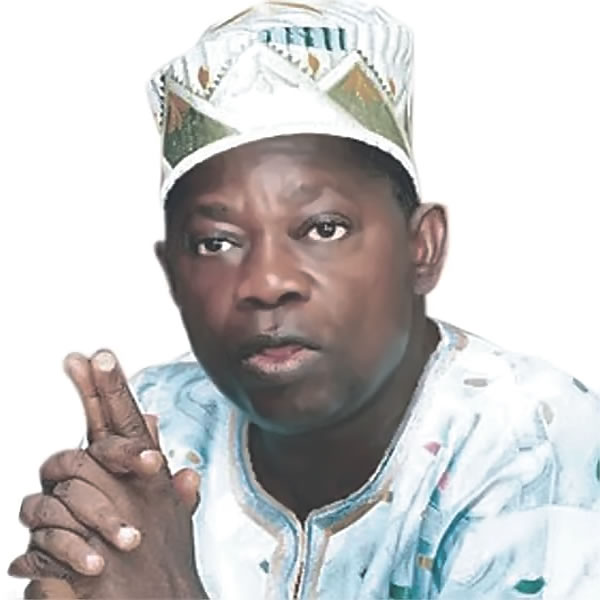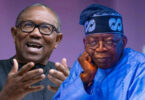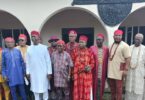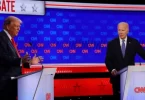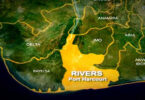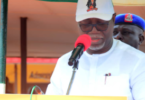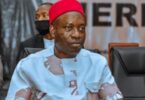The martyr of the struggle that culminated in the Democracy Day, Chief MKO Abiola, identified some individuals who fought gallantly, most of whom today appear to be the unsung heroes of the bloody struggle. In this report, KUNLE ODEREMI brings to the fore Abiola’s last-minute thoughts on those categories of individuals.
ABOUT 48 hours before his death under a curious circumstance, the late business mogul, philanthropist and politician, Chief MKO Abiola personally wrote a lengthy letter to the fiery Lagos lawyer, the late Chief Gani Fawehinmi. In the letter dated July 5, 1998, Abiola gave graphic details of his encounter with emissaries from the international community who made frantic efforts to convince him to renounce his mandate so as to secure his freedom after four years of incarceration and solitary confinement. The candidate of the Social Democratic Party (SDP) explained that he was asked to accept an unconditional release and sign an undertaking to that effect. In the correspondence with Gani, who was a Senior Advocate of Nigeria (SAN), Abiola hinged his refusal to succumb to the pressure “because credibility once lost can never be regained.”
Another striking feature of the letter was the seeming perception by the ebullient politician of the likely dangerous twist to his travail, as about two days after the encounter with those emissaries, he was no longer alive to further pursue his dogged campaign to govern the country based on result of the June 12 poll. He expressly wrote to the irrepressible Lagos-based lawyer that he had been cut off from all media and human contacts for four years, stressing: “I was like a man put in an open grave.”
In a vehement defence of his mandate following claims in certain political circles that events and circumstances had eroded the legitimacy of his cause, Abiola faulted such school of thought. He cited similar political struggle in other lands to further buttress his position. He declared: “First, there is no statute of limitation on valid elections, provided the winner did not willfully refuse to take office. The struggle in Sierra Leone more than three decades ago between Milton Margai and Siaka Stephens is a case in point. The ahiti issue regarding Aristide is partially relevant. If that were so, then, criminals would acquire a lawful right to take advantage of the criminal situation they created. That in my opinion is against equity and the rule of law and, therefore, invalid. They illegally cancelled the election 9which they had no power to do) and promoted their usurpation by putting in the most wicked incarceration ever known—four years without exercise, access to the sun or even the corridors outside my room,” Abiola wrote
Epetedo Declaration
In his resolve to reclaim his mandate, Chief Abiola had on Saturday, June 11, 1994, braced the odds. Backed by vociferous supporters and allies, he openly declared himself as president based on the June 12 election, at what has become Epetedo Declaration. He narrated how he “tried to climb the highest mountain, cross the deepest river and walk the longest mile, in order to get these men obey the will of the people. There is no limitation I have not endured, no snare that has not been put into my path, no ‘set-up’ that has not been designed for me, in my endeavour to use the path of peace to enforce a mandate that you bestowed on me a year ago. It has been a long night.”
JACON, NADECO
In the 20-paragraph letter, however, Abiola listed some of those who constituted part of the real heroes and heroines in the bitter and bloody struggle for the de-annulment of June 12. Then, Gani was the leader and founder of the Joint Action Committee of Nigeria (JACON), which comprised more than 61 pro-democracy and rights groups, as well as professional bodies and labour unions. They included the legal luminary, Chief GOK Ajayi (SAN), Alhaji Lateef Kayode Jakande, the late Chief Bola Ige; Senator Abraham Adesanya; Chief Cornelius Adebayo, Mr Alao Aka-Bashorun; late Rear Admiral Ndubisi Kanu (retd); Commodore Ebitu Ukiwe (RETD), Chief Segun Osoba, Dr Beko Ransome-Kuti; Dr Olu Falomo, general Chief Olabiyi Durojaiye, Ambassador Bariu Adeyemi; Prince Supo Adetona; Lt Col Abubakar Umar (retd), Yakubu Abdul Azeez; Chief Solomon Lar, Alhaji Balarabe Musa; Chief Rasheed Gbadamosi, Kabir Rabiu, Muhammed Arzika, Adamu Ciroma; Chief Debo Akande (SAN), Dr Tunji Dare, Senator Rashidi Ladoja; members of the Eastern Mandate Union (EMU) and the leaders of the Goony people. Abiola urged Gani to send copies of the letter to Chief Sobo Sowemimo and his group; Alhaji Lateef Okunnu; Chief Omowale and Mrs Kuye; Professor Alani Fabunmi of the Obafemi Awolowo University, Professor Nurudeen Alao, Justice Muri Okunola, Oba F. Adesanoye of Ondo Kingdom and Senator Anthony Adefuye.
Unsung heroes, heroines
Following the cancellation of the election generally described as the freest and fairest and most credible in the annals of the country, the international community had complemented the intense and sustained struggle by Nigerians against the flagrant injustice and disregard for the voice of the people by the military oligarchy. By June 11, 1994, Abiola found a compelling reason to declare himself president-elect at a rally now called the Epetedo Declaration. But 12 days after that historic event, the military hegemony arrested him, accused of treasonable felony, humiliating him with long solitary confinement. JACON became a potent force in the struggle to secure his freedom to make him actualize the mandate given to him at the poll. JACON comprised of 61 mass-based groups that cut across various strata of the society and professional bodies and ethnic nationality organisations. The list consisted of the committee for the Defence of Human Rights (CDHR) under the leadership of Comrade Femi Falana; National Conscience Party (NCP) founded by Chief Fawehinmi; United Front for Democracy (UFD) led by Dr Oladipo Fashina; Congress for northern Youths for Democracy (CNYD) under Mallam Uba Sani; Movement for National Reformation (NMR) led by Engineer Alex Ayotalumo; Human Rights Africa led by Dr Tunji Abayomi; Eastern Mandate Union (EMU) led by Jimmy Imo; Committee for Unity and Understanding (CUU); Campaign for Democracy (CD); Ife Collectives led by Professor Omotoye Olorode; Doctors for Human rights in Nigeria (DHRN) under Dr Tunji Mebawondu; Oodua Youth Liberation Group (OYLG) led by Comrade T. A. Aman; Movement for the Advancement of Democracy (MAD) under Mrs J. O. Yusuf Congress of progressive Youth led by Omoyele Sowore; National action Committee (NAC); Constitutional Rights Project (CRP) led by Dr Clement Nwankwo.
Among those who also constituted the pillars of the campaign for the de-annulment were one of his wives, Kudirat; United States of America Ambassador to Nigeria then, Walter Carrington; Pa Solanke Onasanya, whose private residence in Surulere came under constant siege, bombardment and invasion by goons of the military establishment and other security services; another dogged fighter and legal luminary, Dr Olisa Agbakoba; the late Chief Adekunle Ajasin; eminent clerics like Olubunmi Okogie; Sam Mbang; Abiodun Adetiloye.
Those true heroes of the democracy in Nigeria have either passed on without due appreciation of the invaluable sacrifice and self-denial they subjected themselves to or received courtesy the crude and brutal force of the establishment in cahoots with a conscienceless few among the political class, some of who openly supported the criminal annulment of the poll and keyed into the propaganda machinery of the state to demonise June 12. Some of those elements peevishly formed the arrowheads of a one million-man march. A few of the current political leaders in the existing political parties were part of the orchestra, whose primary aim was to elongate military hegemony by foisting the late General Sani Abacha on the country as civilian president through a five-political parties structured programme to actualise the transmutation agenda of the maximum military leader.
Pa Anthony Enahoro, who was the chairman of the National Democratic Coalition, National Democratic Party (NADECO), Chief Ayo Adebanjo, Honourable Olawale Oshun; founder of the Oodua Peoples Congress (OPC), Dr Fredrick Fasehun; former presidential hopeful, Chief Olu Falae traditional ruler in Ondo State, Prince Dayo Adeyeye; Chief Supo Shonibare, Reverend Tunji Adebiyi, Lam Adesina, Dan Suleiman, Ms Ayo Obe, Professor Adebayo Williams, Segun Gbadegesin; Chief Frank Kokori of NUPENG secretary general; Nobel Laureate, Professor Wole Soyinka, Kudirat who was assassinated on a Lagos street, while she was on her way to attend a programme as part of the democratic struggle, just as Senator Adesanya escaped by whiskers, assassination bid on Lagos Island. Ajasin and 31 others were hounded into jail and labeled as prisoners of war by an overzealous military state administrator in Oyo state for their demand for the authority to uphold the will of the electorate. Pa Alfred Rewane, a business man with uncompromising stance for good governance and rule of law and democratic niceties, was not left out in the oppressive and dehumanising action of those behind the annulment.
The contributions of Pa Onayansa were widely acknowledged by other leaders that formed the fulcrum of the struggle. Tinubu had described him as a great fighter and an exemplary leader. Tinubu said: “Papa, you lived a great and exemplary life, you fought a triumphant battle against dictatorship and tyranny. You were consistent in standing for truth and integrity throughout your life. There is no way the history of democratic struggle in Nigeria can be written without your name emblazoned in gold. You are no more with us physically, but your example of honour and dignity will continue to inspire future generations, to live in the hearts of millions even when we are no more here.” Similarly, Osoba said Onasanya truly fought a good fight and that the entire country, Africa and the whole world will never forget his footprints in the sands of democracy. Another foremost nationalist, Pa Ayo Adebanjo said Onasanya’s courage was the force behind the struggle which he described as being between life and death. “Despite his age, he was committed to the cause of June 12, 1993 elections. Even when we were detained over false allegation of killing Kudirat Abiola, he remained resolute. He was a man of honour who stood by his people during the dark days,” Adebanjo said. A former Ekiti State governor, Otunba Niyi Adebayo, in his tribute, said the best way to honour him is for the younger generation to continue where he stopped. ”He has run a good race and he has gone, so let us continue where he stopped,” Adebayo said.
Mallam Garba Shehu, spokesman for former President Muhammad Buhari also recalled the different obstacles some forces tried to create before and years after June 12, which the last administration attempted to redress. He said that that some “men and women in the temple of justice who used one subterfuge or the other to keep June 12 buried and its biggest symbol, MKO Abiola in detention until his end came (or was induced). Remember that since the incident took place, no past administration in 25 years has asked the question: Why was the election annulled? Who annulled it? What were the consequences? Beyond Abiola and his late wife Kudirat, how many people did the nation lose? In terms of the economy, how much was lost? How much of a dislocation was it, socially, politically and internationally? Overall, how much damage did it cause the nation?”
It should be recalled that on June 10, 1993, the late maverick politician, Chief Arthur Nzeribe moved to abort the poll through a court order which his group, Association for Better Nigeria (ABN), obtained from late Justice Bassey Ikpeme of Abuja High Court. However, the then chairman of the National Electoral Commission (NEC), Professor Humphrey Nwosu, leaned on section 19(1) of the presidential election decree 13 of 1993 to hold the election. The section said: “No interim or interlocutory order of ruling, judgment or tribunal before or after the commencement of this decree in respect of any intra-party dispute or any matter before it shall affect the date or time of holding the (presidential) election.”
As the country marks the 31st anniversary of June 12 and Democracy Day, the views expressed by the Christian Association of Nigeria (CAN) President, Archbishop Daniel Okoh, is edifying. He said the efforts of those that fought to enthrone democracy should not go unnoticed and appreciated by Nigerians. “Their struggles and sacrifices have paved the way for the democratic government we enjoy today. We must never forget their efforts and their contributions to our freedom. On this day, we also remember the annulment of the free and fair election of Chief Moshood Kashimawo Olawale Abiola as President on June 12, 1993. This event was a watershed in our nation’s history, and it reminds us of the need to uphold the principles of democracy, justice, and fairness at all times as responsible citizens. As Nigerians, we must learn from the lessons of June 12 and strive to build a nation where democracy is truly entrenched. We must put aside our religious and cultural differences and work towards the common goal of a better Nigeria. Our leaders must prioritise the needs of the people and ensure that they are accountable to the citizens they serve. Furthermore, as we celebrate Democracy Day, we must recognize that there is still much work to be done.”
ALSO READ: June 12 Protest: Lagos CP, Fayoade, assures zero tolerance for lawlessness

